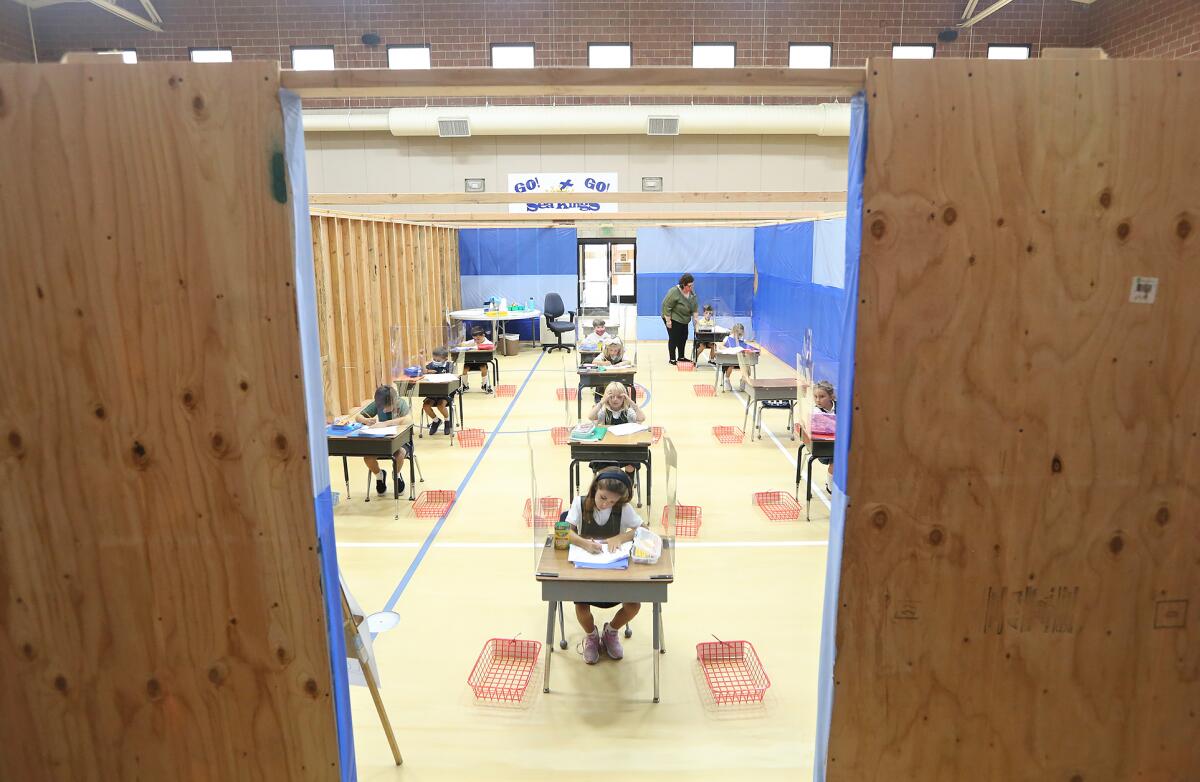Commentary: Are we using kids as human guinea pigs?

- Share via
It’s a fine kettle of fish!
Older people are afraid. Parents are afraid. This pandemic has scared almost everyone. And that is why it’s so odd that we are focused on opening the schools, no matter what.
The “what” is the kicker.
What we don’t know about this virus could fill a library. We don’t know if immunity lasts. We don’t know the long-term effects on children, on teenagers, on anyone. Will boys be more affected than girls? Will it come back around and be worse? Is herd immunity even possible, and will it mean that millions of people die? Will we have a vaccine? When? Will it work?
And yet we are bent on sending our kids back to school. Our reasons for using children as human guinea pigs, sweet canaries in well-decorated classrooms, are varied. We say that the kids are bored, and they miss their friends. We suddenly worry about their mental health, to which heretofore we have only given a minute’s interest.
But what have we done?
Have we hired more counselors, psychologists, social workers? Have we hired competent administrators? Have we lowered class sizes so that so that kids will have a better chance? How much attention have we paid to poverty and that horrendous effect on kids?
This new found interest in students’ mental health is in so many ways phony.
The effort to convince everyone these kids just have to go back to school is puzzling, troublesome, and you have to wonder why. Has it become like everything else — political?
Clutching pearls has become a Newport-Mesa Unified School District pastime with all this concern about what this distance learning is doing to the kids. My question is where was all this worry about what regular school has done to lots of kids from time immemorial?
It might come as a great surprise to some of you (and to others of you who experienced the agony of junior high) that there is a huge percentage of students who dread going to school every day. Have we made a wild attempt to address that?
Face it! Distance learning has been a blessing for some kids. They don’t have to worry about being pushed around during lunch and in the halls. They don’t have to worry about the inevitable distraction of an in-person classroom. They don’t have to worry about what they’re wearing. They don’t have to worry about being made fun of. It’s pretty hard to make fun of someone when the teacher is looking right at your little face on that screen.
I keep having this thought about World War II when kids were experiencing bombs nightly during the blitz and being sent away to strangers in the country without their parents. People were forecasting all kinds of mental problems, but for the most part these kids who lived under amazing stress and danger didn’t seem to have any additional mental health symptoms. In fact it made them stronger.
And here’s the other thing, going back to school won’t be the same. If this district actually follows the rules: social distancing, masks all day for everyone, funny rules about going to the restroom, and all the rest of the odd things that are going to happen, including every once in a while seeing the abject fear in the eyes of some of their teachers, and even some fellow students, it will not be normal.
Let’s figure it out so that children who are in danger at home get help. Let’s figure it out so that parents who work get some help. Let’s figure it out together, parents, teachers and kids.
Let’s finally make Newport-Mesa the gold standard for the health and safety of children.
The writer is a Newport Beach resident who taught at the Newport-Mesa Unified School District for 40 years.
All the latest on Orange County from Orange County.
Get our free TimesOC newsletter.
You may occasionally receive promotional content from the Daily Pilot.





